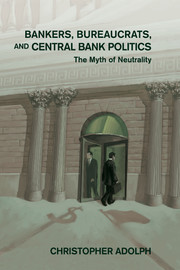Book contents
- Frontmatter
- Contents
- List of figures
- List of tables
- List of boxes
- Abbreviations
- Acknowledgements
- 1 Agents, institutions, and the political economy of performance
- 2 Career theories of monetary policy
- 3 Central banker careers and inflation in industrial democracies
- 4 Careers and the monetary policy process: Three mechanism tests
- 5 Careers and inflation in developing countries
- 6 How central bankers use their independence
- 7 Partisan governments, labor unions, and monetary policy
- 8 The politics of central banker appointment
- 9 The politics of central banker tenure
- 10 Conclusion: The dilemma of discretion
- References and Author index
- Subject index
- About the type, figures, and data
- Other Books in the Series
5 - Careers and inflation in developing countries
Published online by Cambridge University Press: 05 April 2013
- Frontmatter
- Contents
- List of figures
- List of tables
- List of boxes
- Abbreviations
- Acknowledgements
- 1 Agents, institutions, and the political economy of performance
- 2 Career theories of monetary policy
- 3 Central banker careers and inflation in industrial democracies
- 4 Careers and the monetary policy process: Three mechanism tests
- 5 Careers and inflation in developing countries
- 6 How central bankers use their independence
- 7 Partisan governments, labor unions, and monetary policy
- 8 The politics of central banker appointment
- 9 The politics of central banker tenure
- 10 Conclusion: The dilemma of discretion
- References and Author index
- Subject index
- About the type, figures, and data
- Other Books in the Series
Summary
The IMF reports to the ministers of finance and the governors of the central banks, and one of the important items on its agenda is to make these central banks more independent – and less democratically accountable … it always puts far more weight on inflation than on jobs. The problem with having the rules of the game dictated by the IMF – and thus by the financial community – is not just a question of values (though that is important) but also a question of ideology. The financial community's view of the world predominates – even when there is little evidence in its support.
JOSEPH STIGLITZ, former chief economist of the Work BankIN DEVELOPED COUNTRIES, central bankers' past careers shape their preferences over monetary policy. This happens directly, through socialization, and indirectly, by giving central bankers incentives to select the monetary policy preferred by likely future employers. Put another way, central bankers can use monetary policy to grease a revolving door connecting the central bank and private finance and the state. These career effects lead former financiers to be monetary policy hawks and make doves of former bureaucrats.
In this chapter, I turn to the developing world. Past scholarship on developing country central banks finds little traction for concepts such as central bank independence that seem important to monetary policy making elsewhere. Some conclude that developing economies have weak institutions and give up hope of deciphering the implications of developing countries' laws.
Perhaps we have misunderstood the motivations of developing world central bankers from the start. I explore the career socialization and career ambitions of central bankers in less developed countries.
- Type
- Chapter
- Information
- Bankers, Bureaucrats, and Central Bank PoliticsThe Myth of Neutrality, pp. 143 - 181Publisher: Cambridge University PressPrint publication year: 2013



